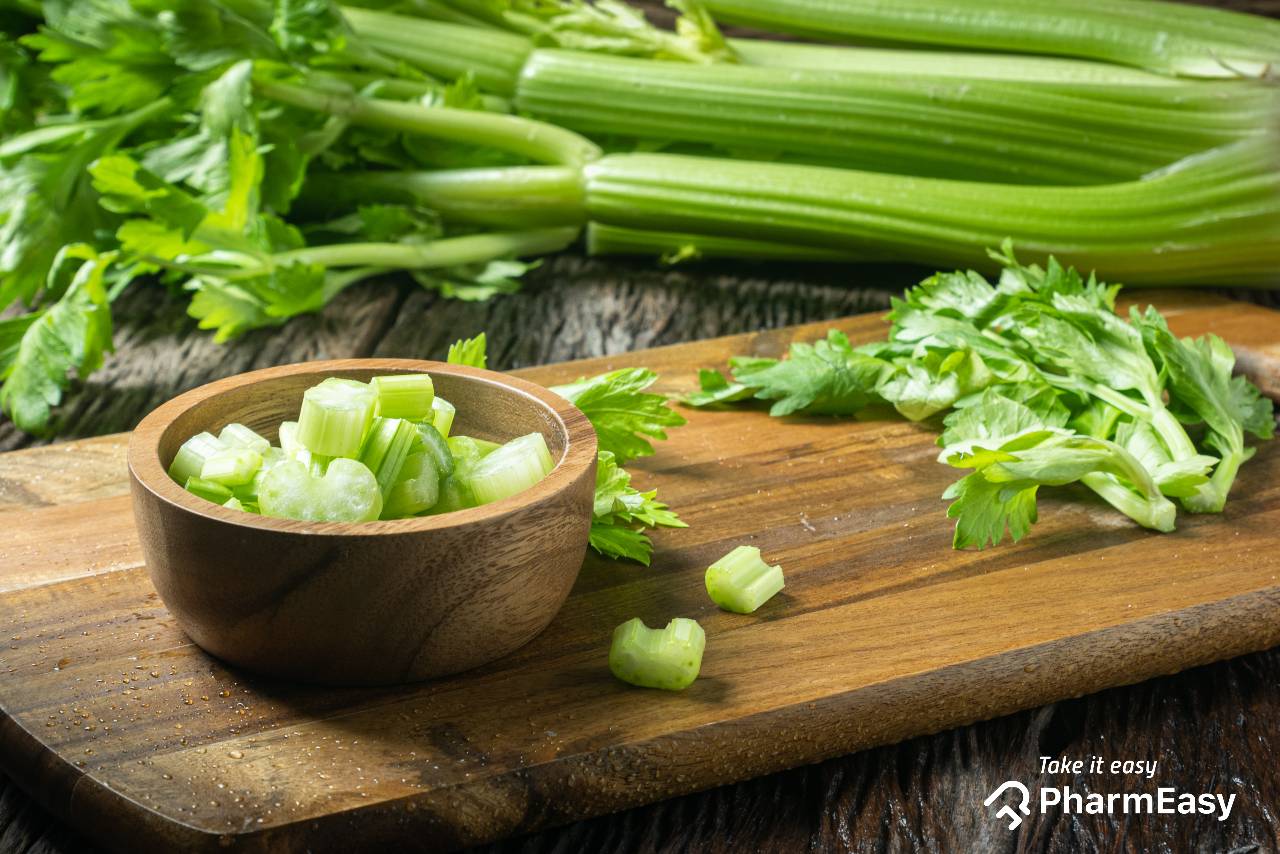8 Health Benefits Of Eating Celery
By Mansi Shah +2 more

Get,

to manage your symptom
Get your,


4 Cr+ families
benefitted

OTP sent to 9988776655



You’ve successfully subscribed to receive
doctor-approved tips on
Whatsapp

Get ready to feel your best.

Hi There,
Download the PharmEasy App now!!


Register to Avail the Offer
Send OTPBy continuing, you agree with our Privacy Policy and Terms and Conditions

Hi There,
Sign up on PharmEasy now!!
Trusted by 4 crore+ families

OTP sent to 9988776655



You have unlocked 25% off on medicines




Code: NU25
By Mansi Shah +2 more
Table of Contents
Among the array of green vegetables that provide many health benefits, celery stands out as particularly noteworthy.
Celery is a marshland plant and shares the same family as carrots and parsley. It has long, pale green, firm, fibrous stalks, approximately 8 to 10 stalks per bunch, which taper into leaves at the top. It is very popular for being low in calories and is known for its high water content and offers several other health benefits1.

Celery has numerous health benefits and is nutrient-rich. Celery contains almost 95% water and is a good source of vitamin K, vitamin A, vitamin C, folate, potassium, and calcium. It also contains small amounts of protein, fat, and just 1.4g of carbohydrates. Celery is rich in useful antioxidants, phytonutrients, and flavonoids, making it a valuable addition to a healthy diet1.
Celery may act as a major source of naturally occurring active substances with various biological properties1,6. Some properties of celery include:
Celery contains naturally occurring compounds such as androstenone and androstenol, which are also found in the human body. These compounds have been studied in various contexts related to human biochemistry and scent. While some research4 has explored their roles in communication and hormonal pathways, no conclusive claims can be made regarding their effects on attraction or arousal. Celery remains a nutritious vegetable and can be a part of a balanced, healthy diet.
Some laboratory studies4 have explored the antioxidant content of celery and its potential role in protecting cells from oxidative stress. Oxidative stress is known to affect various bodily functions and reducing it may support overall cellular health. While certain experimental models have examined the impact of celery extract on biological markers, including hormone regulation and reproductive cells, these findings are preliminary. More clinical research is needed to establish any specific role of celery in male reproductive health7.
Celery is rich in antioxidants that can help to reduce the risk of cancer. It contains two potent anti-cancer compounds (apigenin and luteolin) which promote free radical destruction and may promote cancer cell death. Celery contains bioactive polyacetylenes, these compounds have the potential to help reduce numerous cancer cell formations. Celery may be beneficial to protect individuals from pancreatic and breast cancers7.
Celery contains many phytochemicals known as phthalides. These compounds may help relax the artery muscles and increases blood flow5.
Additionally, celery is known to contain nitrates, which can further contribute to relaxing the smooth muscles of blood vessels, potentially supporting healthy blood pressure levels. In traditional Chinese medicine, celery and its extracts have long been used for their purported ability to help manage blood pressure.
Celery is rich in antioxidants that contribute to its anti-inflammatory, antibacterial, and anti-viral properties. Celery also contains a compound called luteolin that can prevent inflammation in the brain cells. Research13 suggests that celery extract acts like anti-inflammatory drugs like aspirin and ibuprofen. It may also have a pain reducing effect. And it may be protective against stomach damage that can occur from taking drugs such as non-steroidal anti-inflammatory drugs (NSAIDs).
Celery contains apigenin that is excellent for the growth and development of nerves. Apigenin may also contribute to the health of neurons.
Celery also prevents memory loss as it contains a specific compound known as L-3-n-butylphthalide. Celery extract plays a valuable role in treating Alzheimer’s disease and preventing it from developing in the first place9.
As it contains antioxidant and anti-inflammatory nutrients, it may offer protection to the entire digestive tract. The natural fibre found in celery makes it an essential food for the digestive system. The soluble fibre in celery will be fermented by the bacteria present in the large intestine and this fermentation process promotes digestive health10.
Celery is a low-calorie vegetable which may make it beneficial in weight management. The insoluble fibre content in celery can increase satiety and help in weight loss. Celery’s high-water content may also contribute to weight loss and regulate lipid metabolism11.
Did you know celery may induce premature delivery in pregnancy? I came across a study8 conducted in 2017, and it said that excess consumption of celery by a pregnant lady may induce uterine contractions, resulting in premature delivery.
Dr. Smita Barode, B.A.M.S M.S.
Celery, often considered just a crunchy snack, is actually a versatile vegetable that can be used to make a variety of delicious dishes. Here are some celery recipes that you can try:

A classic celery soup is a comforting dish that brings out the vegetable’s natural flavours. To prepare, sauté chopped celery, onions, and garlic in butter until they become tender. Add vegetable broth, simmer, and blend until smooth. Season with salt and pepper, and garnish with fresh herbs for a delightful, nutritious soup.

Combine thinly sliced celery with apples, walnuts, and a light vinaigrette for a refreshing salad. The crisp texture and slightly peppery flavour of celery makes it an excellent addition to salads.

Celery sticks paired with peanut butter can make an ideal snack. The crispness of celery complements the creamy texture of peanut butter, providing a satisfying and protein packed treat.

For a savoury and tangy dip, combine cream cheese, blue cheese, sour cream, and minced celery. This dip is great with fresh celery sticks, making it a perfect appetiser for parties and gatherings.

Sautéed celery with garlic and herbs is a delightful side dish that elevates the flavour of this humble vegetable. The gentle sautéing process enhances celery’s natural crunch and imparts it with a subtle garlic and herb-infused aroma. It’s a simple yet flavourful way to enjoy the benefits of celery while adding a delicious touch to your meal.

Incorporate celery into a stir-fry with your choice of protein and other vegetables. The crisp texture of celery adds a satisfying crunch to the dish.

Celery juice, packed with essential nutrients like vitamins A, K, and C, has become a popular health choice. Celery juice may help with digestion and reduce inflammation. However, it’s important to approach these claims with caution, as scientific evidence is still limited. While celery juice can be a refreshing and hydrating addition to your diet, consult with a healthcare professional before relying on it as a cure-all solution2.

Celery smoothies are a nutritious and refreshing way to incorporate this green vegetable into your diet. These blended concoctions combine celery with ingredients like spinach, apples, and ginger, providing a boost of vitamins, minerals, and antioxidants. Celery smoothies are known for their potential to support digestion, reduce inflammation, aid in weight management and skin health.
These celery recipes highlight the vegetable’s versatility and ability to elevate various dishes. From soups and salads to snacks and smoothies, celery can be a delightful addition to your meals.
While celery is generally a healthy addition to most diets, it is important to note that consuming it in excess may cause digestive discomfort in some individuals. Celery contains mannitol, a type of sugar alcohol, which, in high concentrations, has been linked to digestive issues such as bloating or gas. Research14 suggests that mannitol can be difficult for some people to digest, leading to these unwanted side effects. If you experience discomfort after eating celery, it may be helpful to moderate your intake or consult with a healthcare professional for further guidance.
Dr. Rajeev Singh, BAMS
If you’re considering incorporating more celery into your diet, it’s important to know how to select and store it properly to maximize its nutritional benefits. Keep these tips in mind the next time you’re shopping for or preparing celery, ensuring you make the most of this versatile and healthful vegetable:
One of the best ways to enjoy celery’s dietary benefits is to steam the leafy green for a few minutes to retain its nutrients. This method keeps most of the nutrition locked in, as well as preserves the flavour. You may also eat the leaves since they are high in nutrition (especially calcium and vitamin C) and should be consumed within a couple of days.
Studies8 have shown that some people may have significant allergic reactions when exposed to celery. Some signs include troubled breathing and rashes. I strongly recommend the use and consumption of celery only under the guidance of a medical professional.
Dr. Siddharth Gupta, B.A.M.S M.D (Ayu)
Storing celery properly is essential to maintain its freshness, crispness, and nutritional value. One effective method is to wrap celery in aluminium foil, which helps retain moisture while allowing excess ethylene gas to escape, thereby slowing down spoilage. Alternatively, placing celery in an airtight container can help preserve its hydration and prevent it from absorbing odours from other foods. For optimal storage, keep it in the vegetable crisper drawer of the refrigerator, where the humidity is regulated to suit fresh produce. Another option is to store celery stalks upright in a container filled with water, changing the water every few days to keep the vegetable hydrated and fresh. Following these practices can significantly extend the shelf life and quality of celery.
Studies12 have reported the following side effects of celery:
If you have any adverse reactions to celery, make sure to consult a doctor immediately.
The following are the precautions to be taken before having celery:
However, additional research on celery is needed. Please consult your doctor to avoid any problems.
Celery (Ajmoda) may react with the medications and alter the activity of medicines. However, no such information is available and more research on this topic is required. Please discuss and confirm with a doctor before adding celery to your diet, especially if you are undergoing any treatment.
Celery is widely regarded as one of the best diet vegetables for a health-conscious diet, offering many nutritional health benefits. It is known for its high water content and can be used in many dishes. Celery contains several vitamins, minerals, and antioxidants, and is commonly included in meal plans that emphasise hydration, weight management, and balanced nutrition. Regular inclusion of celery in meals can be a part of maintaining a healthy lifestyle and overall dietary variety.
Also Read: Bottle Gourd (Lauki): Uses, Benefits, Side Effects and More!
Celery is widely recognised for its health benefits, making it a valuable addition to a balanced diet. Its high fibre content and low-calorie nature make it a great addition to a balanced diet. Other benefits of eating celery include promoting hydration, aiding digestion, and providing essential vitamins and minerals.
No, celery and coriander are different plants. Celery is a vegetable with crisp stalks and leaves, while coriander, also known as cilantro, is a herb with fresh leaves and seeds. They have distinct flavours and culinary uses.
No, celery and parsley are not the same; they are two distinct herbs. Celery is a vegetable known for its crunchy stalks and leaves, often used in cooking and as a garnish. Parsley, on the other hand, is a herb with vibrant green leaves, known for its fresh, peppery flavour and is used as a garnish or seasoning in various dishes. While they may look similar, they have different tastes, culinary uses, and botanical classifications.
Yes, celery can be frozen. It’s recommended to blanch it first to retain its freshness. Thawed celery is best used in cooked dishes like soups, stews, and casseroles.
Yes, dogs can eat celery in moderation. It’s a healthy, low-calorie snack for them, but it should be cut into bite-sized pieces to prevent choking, and it’s best served plain without added salt or seasonings. Always consult with a veterinarian before introducing new foods to your dog’s diet.
Yes, celery is a stem vegetable. It is known for its crisp, edible stalks, which are commonly used in various culinary applications.
Yes, rabbits can eat celery in moderation. It’s a low-calorie and hydrating vegetable and can be given as an occasional treat, as excessive consumption may lead to digestive issues. Always introduce new foods slowly and consult a veterinarian to incorporate a well-balanced diet.
Celery typically lasts in the fridge for about 2 to 4 weeks when stored properly. To extend its shelf life, wrap it in aluminium foil or a sealed plastic bag, and keep it in the crisper drawer of the fridge. Trimming the leaves and maintaining humidity can also help keep celery fresh for a longer time.
Cats can eat celery in small quantities, but it’s not a natural part of their diet, and some cats may not show interest to it. If offering celery, ensure it’s cut into small, manageable pieces to prevent choking. Always prioritise a balanced diet for their complete nutrition by consulting with a veterinarian,
Disclaimer: The information provided here is for educational/awareness purposes only and is not intended to be a substitute for medical treatment by a healthcare professional and should not be relied upon to diagnose or treat any medical condition. The reader should consult a registered medical practitioner to determine the appropriateness of the information and before consuming any medication. PharmEasy does not provide any guarantee or warranty (express or implied) regarding the accuracy, adequacy, completeness, legality, reliability or usefulness of the information; and disclaims any liability arising thereof.
Comments

Leave your comment...
You may also like
Comments